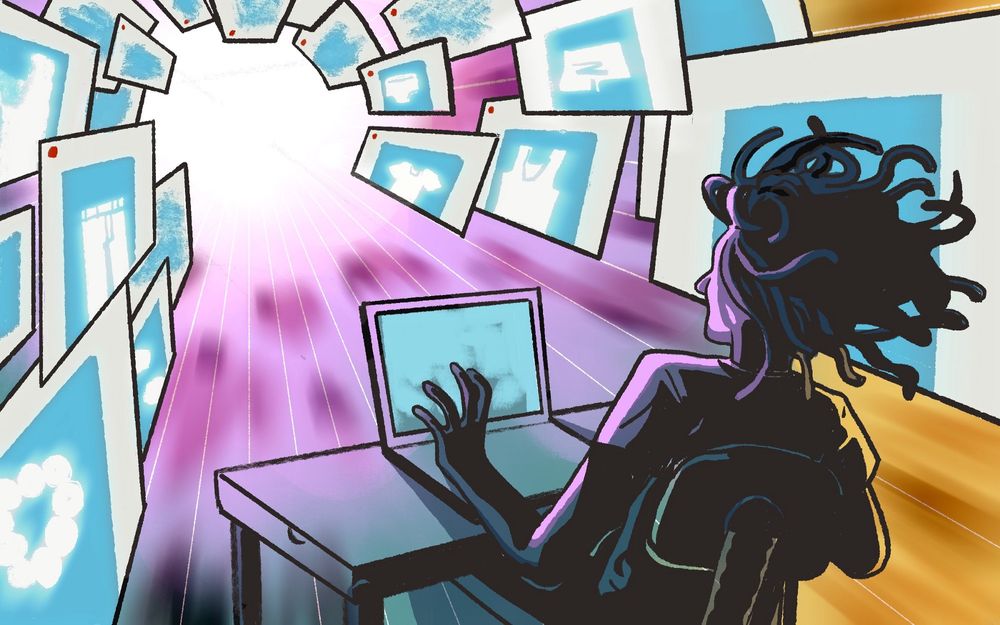Illustration: Chris Kindred
I love my closet, but my new job probably won’t. Is there an easy way to level up a T-shirt and jeans wardrobe without blowing my entire first month’s pay?
Well, well, well! If your job is letting/encouraging/forcing you to work from home because of the pandemic (and you’ve been fortunate enough not to be laid off), you might be able to save up and blow your second month’s pay on a new wardrobe. Problem solved. Of course, you might not be working from home, and hopefully, the pandemic will be over one day.
The easiest thing to do, if you don’t feel like spending a lot of money or overthinking it, is to just buy a bunch of stuff at the mall, or at least the digital equivalent: Banana Republic, J. Crew, etc. Get a navy suit, a gray suit, a few white shirts, a few blue shirts, some black shoes, a black belt, and keep it moving. It’s not the sexy answer, but it works. (If you need sexy, Rick Owens once said that a younger, broker Rick would shop at Uniqlo.) I don’t know what kind of job you have that frowns on T-shirts and jeans, but mall stuff is probably fine for whatever conservative atmosphere you’re clocking into.
But, you’re a person who likes clothes, it sounds like, which is why your closet is so loveable. How did your closet get that way? Did you buy it all in one weekend with the first paycheck from your last job? Probably not, right? It took time. Read some fashion magazines. Read some menswear blogs. Read some fashion magazines’ menswear blogs. Watch some runway shows. When it’s safe again, go to your local fancy clothing store for some “look, but don’t touch” (or some “look and touch, but don’t buy”). Figure out the kind of look you want, what kind of stuff you like, and what you can get away with at the office. Then, start picking things up. A pair of slacks here, a sportcoat there, a pair of hard bottoms, a nice tie, etc. But the stuff doesn’t have to be new (or expensive, even). Find a consignment shop you like or a good resale website. Go to a thrift store, and take some stuff to the tailor.
If this all sounds basic, it’s because it is. But it’s also easy if you don’t mind being a little patient. The motto of the street style photographer Mordechai “Mister Mort” Rubinstein is “some men get dressed.” The men in his photos may not all be dressed expensively, but they’re always dressed well.
My cousin is always telling me to support Black-owned businesses, but how do I actually do that, especially now that there are so many of them?
Ask your cousin! Seriously. If you have the kind of relationship with your cousin where they’re asking you to do something, and you eventually listen, you should ask them the best way to do what they’ve been asking you to do. It’ll make for a nice bonding experience. But maybe you and your cousin are no longer on speaking terms.
For starters, supporting Black businesses shouldn’t be too difficult. When the Department of Commerce last counted Black businesses in 2012, there were 2.6 million of them. Even Wyoming had a few hundred. But I’m guessing the problem is finding them, to which I would say: Just do some Googles. I know that’s probably infuriating to hear from someone whose stated intention is to answer your questions, but I don’t know where you live. For instance, where I am there’s a specialty website, Black-Owned Brooklyn, dedicated to shouting out Black-owned businesses in the borough. If there’s nothing like that in your area, chances are there’s probably a Black chamber of commerce with a local directory you can peruse. If you don’t have one of those, you don’t have to be picky. If you’ve ever seen a Black someone plugging their business underneath a viral tweet or on your Instagram Explore page, try that. Find any old Black business, online or off, that offers something you want to buy, and buy it. The coronavirus is burning the economy down, so I’m sure any of them would welcome your patronage.
But what’s driving this newfound desire to support Black businesses? Do you think that it’s important to support entrepreneurs who are best able to serve their community because they’re from that community? Are you reacting to persistent discrimination toward Black customers by non-Black business owners? Or vice versa? Is it because you think that doing so is the best way to support the liberation of Black people? If this is the mission that you’re taking up for yourself, then you should go into it with a clear idea of what you’re doing it for. There are plenty of Black businesses that push products that are harmful to Black people. Assuming that you’re Black or a member of another marginalized group, what’s to stop a Black business owner from discriminating against you for some other reason? Says who that capitalism is even the answer at all?
Maybe I’m overcomplicating it. Maybe you just want to put some money in some Black people’s hands. Well, you don’t necessarily need to buy something from a Black business to do that. Yes, support Black businesses, but maybe toss some money to the National Bail Out to free some incarcerated Black moms, or to the Black Youth Project 100 to fund some young Black activists, or to the Okra Project Grocery Fund to feed some Black trans and gender nonconforming folks. Or sprinkle a blessing in a random Black person’s Cash App. Have fun with it.
